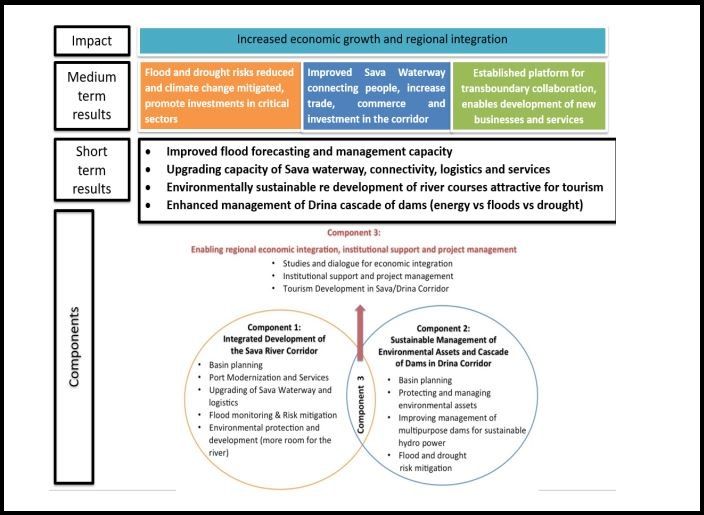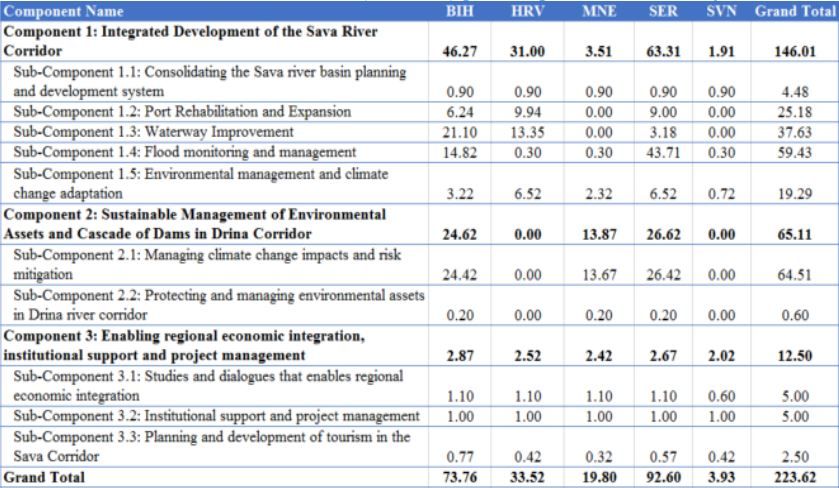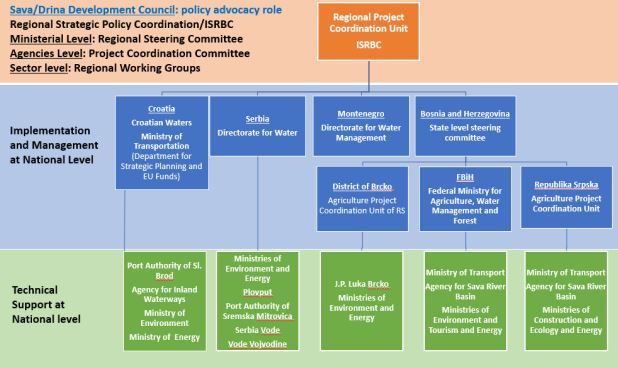Displaying items by tag: montenegro
23 March 2019 - The Government of Montenegro, together with domestic and international partners, is implementing numerous projects and activities for sustainable water resources management and provision of high-quality water supply, and to respond to the global challenges that are also present in Montenegro, Deputy Prime Minister and Minister of Agriculture and Rural Development Milutin Simović said on World Water Day – 22 March.
Opening the Conference on Water Day, DPM Simović said that the concern about water as a resource and the necessary condition of existence is a joint responsibility and obligation. "This is a good opportunity to recall global and local challenges while pointing to everything we do to ensure sufficient water resources and water protection," Simović said.
World Water Day is an annual UN observance day that highlights the importance of freshwater. The day is used to advocate for the sustainable management of freshwater resources. Around one billion people still do not have access to safe and adequate drinking water resources, and three billion lack proper sanitary facilities. This year's theme of the World Water Day is "Leaving no one behind."
DPM Simović recalled that Montenegro is rich in water resources and that, concerning its area, it is one of the wealthiest regions in the world. "95% of the river flows in Montenegro are formed on its territory. For the purpose of water supply, the groundwater is used in as much as 90% of the cases. On the other hand, Montenegro belongs to the Dinaric karst terrain, whose basic characteristic is the irregular dispersion of sources and depths to the level of groundwater, and as a result, we have an uneven distribution of water in the territory of Montenegro," Simović said.
He pointed out that groundwater of karst terrains of Montenegro is a particularly vulnerable resource to pollution, and especially to climate change, and therefore great attention is paid to maintaining their natural functions.
The floods that hit Montenegro in 2010, which had great material consequences and the repetition of the floods in 2012, 2014 and 2016, according to Simović, are seen as a consequence of the increasing impact of climate change.
In February 2017, the implementation of a project supported from EU pre-accession funds “Strengthening the Capacities for Implementation of the Water Framework Directive" has begun in Montenegro.
The Deputy Prime Minister reminded that in the past two years, the national budget provided over 2 million EUR for the implementation of over 100 water supply projects in 20 municipalities.
In the field of flood protection, with the support of the GIZ, a Preliminary Flood Risk Assessment was prepared, as well as a hydraulic model of the Bojana River, which detected dangerous flood zones. "This data will help us to implement further a new regional project in the Drim River basin, prepared by the Ministry of Agriculture and Rural Development with UNDP, with the financial support of the Adaptation Fund. We have just received confirmation that it was approved as the first regional project in Eastern Europe," Simović said. He said that the 1.2 million dollars from the project is planned for Montenegro and will be used to prepare the main project for the rehabilitation of embankments on Bojana River and infrastructure works for the construction of embankments on priority sections.
Simović recalled that the Government of Montenegro gave a systematic response in coping with the consequences of several decades of degradation of river flows due to the uncontrolled exploitation of gravel and sand.
"In April 2017, we introduced a moratorium on the exploitation of materials from river flows," DPM Simović stressed.
With the support of the World Bank, the Ministry of Agriculture is implementing 500,000 EUR worth project to regulate rivers Grnčar and Lim. Another significant regional project will be implemented from April this year, in cooperation with UNDP and UNESCO. A project called DIKTAS SAP, worth a total of 5 million EUR, should contribute to greater integration of domestic experts and training of young people, as well as valorisation and better exploitation of the Dinaric karst groundwater.
Deputy Permanent Representative of the UNDP in Montenegro Miodrag Dašić said that today's gathering is an ideal opportunity for dialogue to define solutions to challenges in the area of water protection and use. He emphasised that water management is essential in the regional and cross-border context, and that UNDP and the Ministry of Agriculture are implementing critical regional projects.
A representative of GIZ for Montenegro Nenad Rakočević said that numerous projects aimed at water protection were implemented in the past seven years in Montenegro. He emphasises that GIZ remains a partner to the institutions in Montenegro in the field of water sector improvement, meeting EU requirements and strengthening cross-border cooperation.
22 March 2019 - We expect to have the first applications for Montenegrin Citizenship by the Investment Programme by the end of this year, while the Programme itself will be entirely in place in 2020, head of the Secretariat for Development Projects, Dejan Medojević, said in an interview with Dnevne Novine daily.
The Montenegro Citizenship by Investment Programme started on 1 January 2019, and it will be limited to 2,000 investors over three years. According to Medojević, there will not be a place either for those working with dirty money nor persons of interests to the security services in this Programme.
“On behalf of the Government of Montenegro, the Secretariat has launched the Citizenship Programme. Before this, the Government had defined requirements that an investor must comply with to get economic citizenship. This is not about the general sale of passports but rather an important development project for Montenegro,” said Medojević.
He reminded of the investment requirements, that is, 100,000 EUR donation in a Government Funds plus.
“The money will be allocated to the less-developed local self-government units and will be spent primarily on infrastructure and facilities which will bring some value to the north of the country,” pointed out Medojević.
On the selection procedure for the applicants Medojević explained that the special mediation agents would first check all of them, then the international credentials agents and then auditors who will be checking whether the money is paid as was planned. Finally, when the Secretariat says that they (investors) have met all the requirements, Prime Minister Duško Marković is to send his proposal to the Ministry of Internal Affairs to put whatever controls it can in place, but, of course, following the Law on Citizenship.
“So, the final controls are to be taken by the Ministry of Internal Affairs and National Security Agency,” concluded Mr Medojević, adding that they will do everything they can “to grant citizenship to most suitable applicants, willing to invest in the development of Montenegro.”
Source: Cafe del Montenegro
22 March 2019 - Investments in Uniprom KAP, around EUR 36 million thus far and an additional 30 million, are an excellent opportunity for Montenegro, its economy, industrial production, and export increase, it was noted today during Prime Minister Duško Marković's visit to the factory.
"A new modern industrial centre is practically being developed in Montenegro. I am sure that most citizens do not know about it, not only in Montenegro but also in Podgorica. New plants and new factories for the finalisation of aluminum production are being developed here," PM Marković said.
He added that in May, a new line for the production of aluminum alloys would be completed, and by the end of the year, we will have a new factory that will provide a path for the production of aluminum billet. In 2020, according to Prime Minister Marković, another new factory for the production of aluminum wire and steel wire is planned.
Owner of Uniprom Veselin Pejović said that EUR 20 million had been invested so far in replacement of 170 cells and other infrastructure.
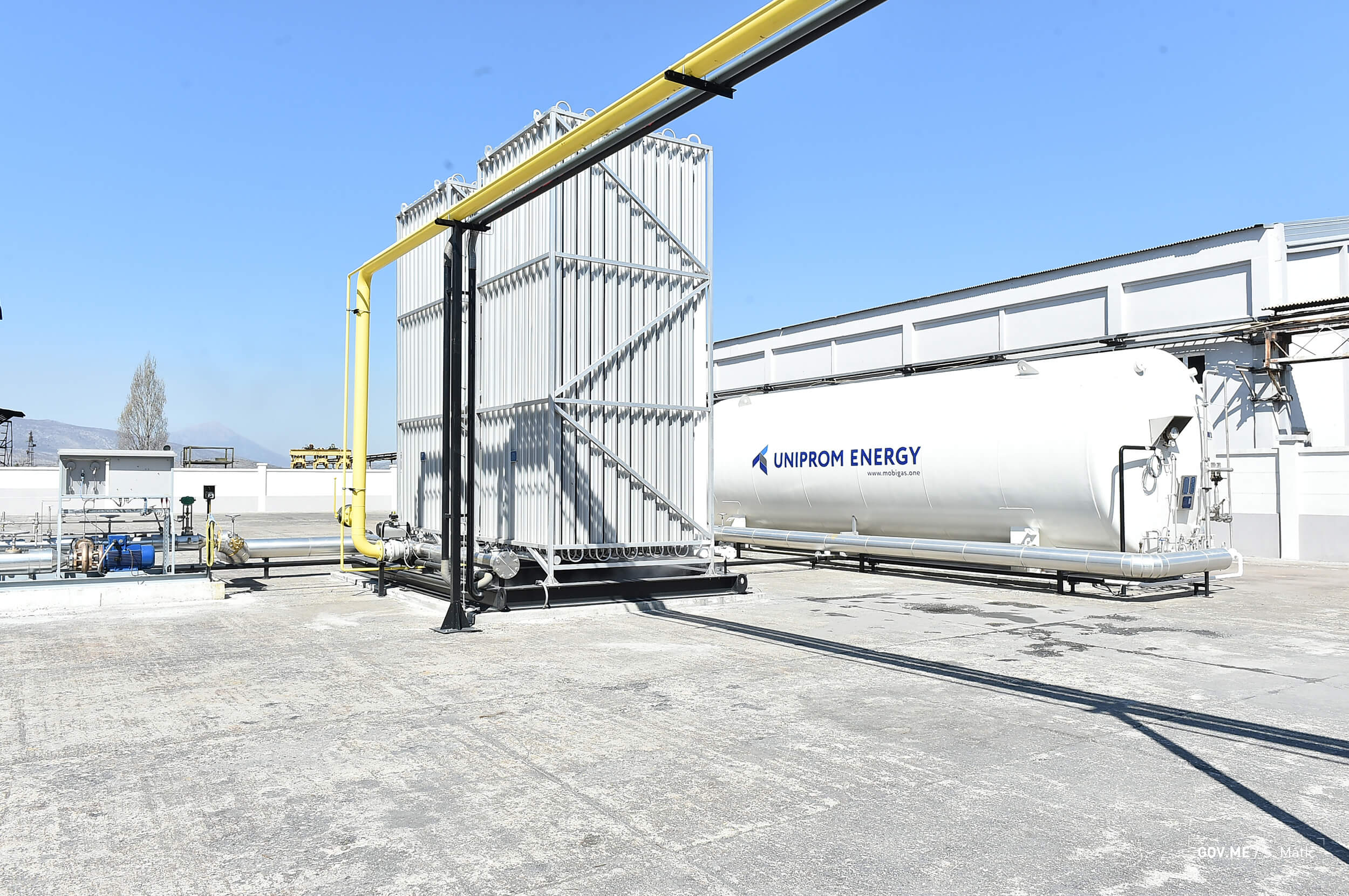
"With the new silumin factory which we will open in the next couple of months, production will be 30,000 tons. The investment is worth EUR 11 million, and the investment for the billet production factory with a capacity of 70,000 tons, which will be open by the end of 2020, is 15 million. These two factories will have a total production of 100,000 tons, which means that in 2020 we should have an export of about 300 million dollars," Pejović said.
Prime Minister Marković praised the fact that KAP uses the new plant for liquefied gas.
"Therefore, fuel oil and oil are removed from use, which is very important for the further development of KAP, but it is also essential for the preservation of the environment," the Prime Minister emphasised.
Pejović specified that the introduction of this system was also important for bringing relevant customers from the European market, and pointed out that Uniprom KAP is the only Balkan-based factory using LNG, liquid natural gas.
"KAP used to spend 10 tons of oil daily. That is equal to 1,000 cars in Podgorica per day and 10 liters of oil per car per day. What polluter! This is no longer a case in KAP," the owner of Uniprom explained.
He added that they had invested EUR five million so far in LNG and gas station. The further development of KAP and the new plants will reach a figure of 20 million to cover all production maximally.
PM Marković especially praised the fact that in such difficult conditions and complex activities, the company cherishes a principle of social responsibility and supports the interests of the community as a whole.
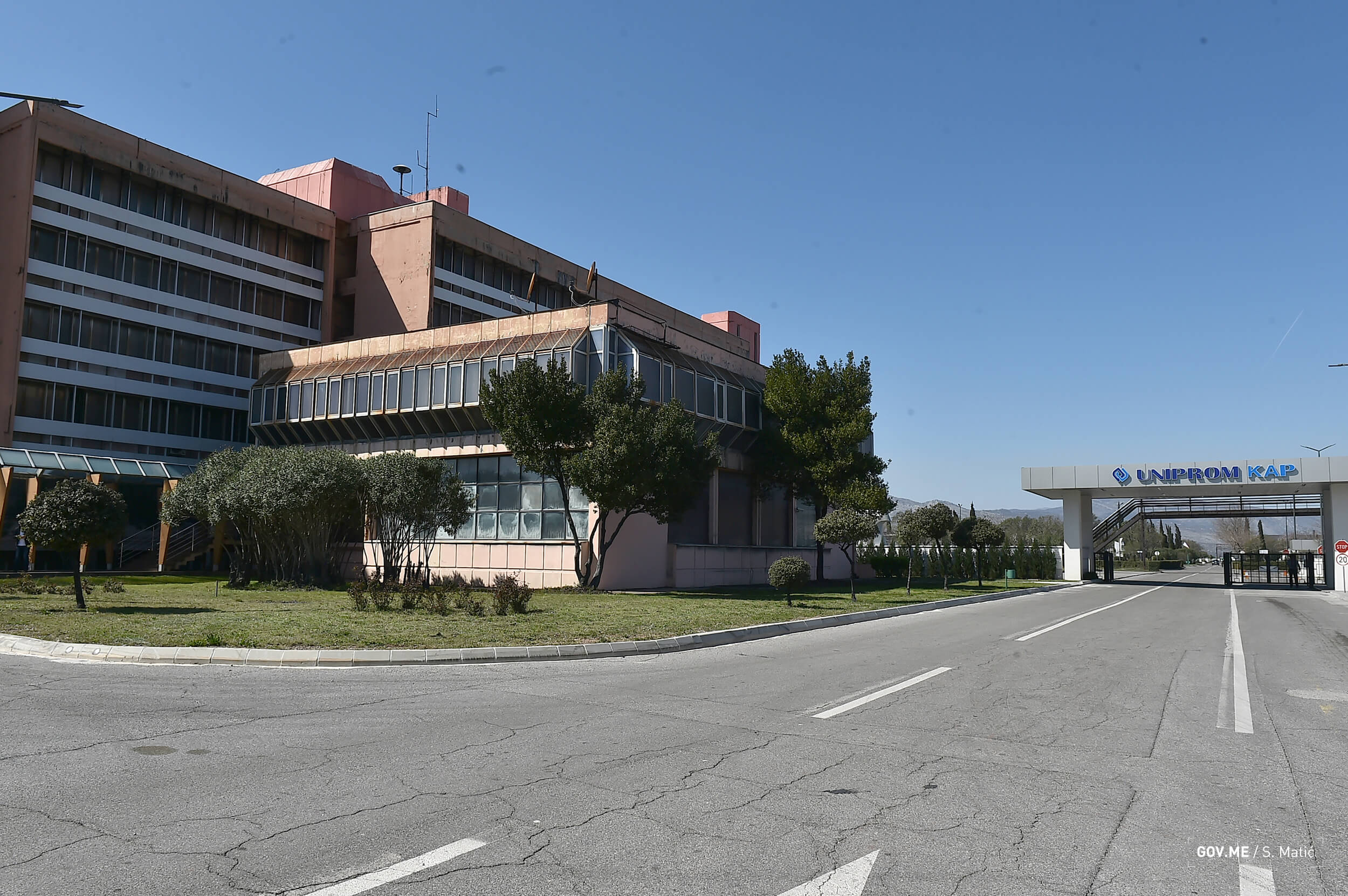
The Prime Minister reiterated that he, the Government and the competent authorities would actively support the fulfillment of investment plans of Uniprom KAP and this development perspective.
Minister of Economy Dragica Sekulić and Minister of Sustainable Development and Tourism Pavle Radulović also paid a visit to KAP.
21 March 2019 - Civic protests do not pose a threat to the state and its political system, according to Prime Minister Duško Marković, who assessed that the Government of Montenegro is persistent in the protection of the state and its citizens.
Prime Minister explained that the demands for the resignation of the representatives of the Government were not grounded because, as he says, the Government has support in the parliament in which it was elected.
At the assembly during which the reporters were allowed to ask the PM questions regarding the current conditions within the country and plans of the Government, Marković announced that the state is becoming more and more stable.
"Montenegrin institutions are capable and ready to protect the constitutional and legal order of our country at any time and in any circumstances, ”Marković estimated. This conclusion of the PM was based on the fact that Montenegro is a state with established institutions; the country is a NATO member, a politically stable country based on democratic and European values.
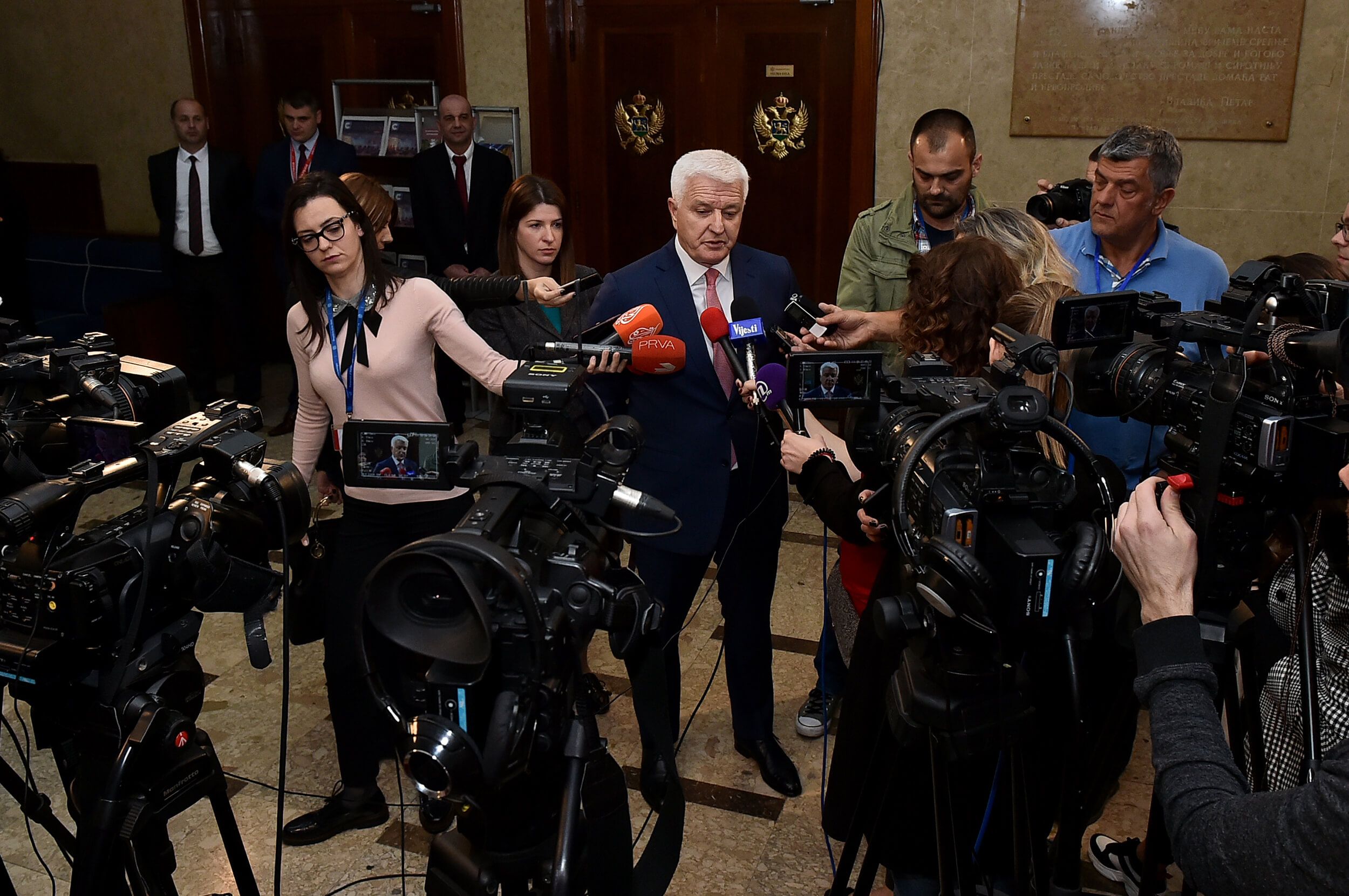
"Therefore, despite the challenges that accompany us, we are achieving to protect the state, protect the citizens and their interests, and the attempts of destabilization have made our security apparatus more compact, and the state more stable," Marković emphasised.
The Prime Minister also pointed out that the European and Euro-Atlantic future, as well as the independence of Montenegro, cannot be endangered in any way: "I want to believe that even protesters do not want to endanger the independence of our country. I want to believe that they do not want to demolish Montenegro, but build the country towards a better future. Still, we will not allow the creation of an overthrowing atmosphere, because that is an ambience that can lead to unwanted consequences, "the PM stated during the assembly.
He added that protests are a democratic and legitimate way of expressing opinions and that the representatives of the Government fully understand their need to emphasize their demands, especially when they are motivated by the desire to improve the standards and quality of life of citizens.
However, as PM explained, the citizens of Montenegro must all agree that the Government is working on improvements daily, which is confirmed by notable results that are visible and measurable.
He pointed out that the economy grew at a rate of almost 5 per cent in the previous two years, that new jobs were created reducing the unemployment by 12,000 people concerning 2016, that development momentum in infrastructure is achieved, as well as the balanced regional development.
He said that the results gave him the right to say that there is no place for protests against the work of the Government: "We provided free tuition for students, 1,500 new places for children in kindergartens, reconstruction and construction of over 150 facilities in the education and health sector, and created new jobs in these sectors".
21 March 2019 - Montenegrin companies will have the opportunity to obtain non-refundable financial aid for at least 1,3 million EUR, through the Programme for the improvement of economic competitiveness.
The Ministry of Economy has consolidated supports to the development of entrepreneurship and business sector and shaped it into a unique programme, with the aim of developing companies and increasing their competitiveness, which will eventually create an export-oriented and robust economy.
Funds will be granted to private companies, established in Montenegro, which pay taxes and contributions regularly and which are away from bankruptcy procedure, as well as for those companies who have not already have financial aid for the same project in the past three years.
This year’s programme envisages six lines of financial support: improvement of innovation, setting international standards, modernization of processing industry, development of clusters, stimulation of direct investments and development of crafts.
In addition, the program will offer two lines of non-financial support – provision of monitoring services and development of entrepreneurship. At the same time, two measures will be implemented – Business zones regulation and promotion of the enhancement of the competitive ability of products and services.
Program line for innovation improvement amounts 50.000 EUR, while 140.000 EUR will be provided for the introduction of international standards. This amount will be used for co-financing accreditation and adaptation of business to international standards. Around 70% of costs will be refunded to the companies.
The budget of the program line for crafts development amounts 50.000 EUR. It will refund up to 20% of costs related to the acquisition of equipment and tools, up to 50% for manifestations, design and promotional material. Deadline for submitting applications is 1st December.
Clusters might be able to get up to 15.000 EUR by the draft project that should be delivered not later than 2nd September. It’s the Amount not higher than 50% of the costs of the project.
Program line for the stimulation of direct investment is worth 1,05 million EUR.
The amount of granted funds is determined by the number of new employees and a score number in the valuation of the investment project. It can range from 3.000 EUR to 10.000 EUR per employee.
A public call will be open by 30 September.
Source: Cafe del Montenegro
21 March 2019 - Minister of Foreign Affairs Srđan Darmanović paid an official visit to the Republic of Kosovo at the invitation of Deputy Prime Minister and Minister of Foreign Affairs Behgjet Pacolli. Minister Darmanović also met with Speaker of the Parliament Kadri Veseli and Prime Minister Ramush Haradinaj.
The officials noted that Montenegro and the Republic of Kosovo have developed very good relations and expressed their satisfaction with the frequent political dialogue that strengthens the overall cooperation. "It is essential that all actors in the region cooperate closely, as well as to act responsibly for the purpose of faster integration into the European Union," said Minister Darmanović.
Kosovo Foreign Minister Pacoli emphasised that the two countries are sincere friends. cherishing good neighborly relations and mutual support.
"The Montenegrin contribution to regional stability is very important and the citizens of our country appreciate it," Minister Pacoli stressed.
The meeting with Speaker of the Kosovo Parliament Veseli noted excellent cooperation between the two coutries, which was confirmed in the previous period when addressing issues of common interest.
"The Republic of Kosovo and its citizens have great respect for the results of the Montenegrin state policy," Mr Veseli underscored. The importance of the parliamentary dimension of cooperation between the two countries was also emphasised as an important segment of the overall relations.
During the meeting with Prime Minister Haradinaj, the head of the Montenegrin diplomacy stressed that Montenegro closely monitors and supports the dialogue between Kosovo and Serbia, stressing that it is important for the two sides to achieve a sustainable agreement that will be in the function of the long-term stability of the Western Balkans. Commenting on bilateral relations, the Kosovo Prime Minister said that " Montenegro is an example of successful development and a role model in European and Euro-Atlantic integration process." The two officials also pointed out the need to boost economic cooperation between the two countries, primarily through better infrastructure connections.
Minister Darmanović particularly highlighted the issue of the status of the Montenegrin community in Kosovo, which is in the focus of attention of the Government of Montenegro, hopeful that the Montenegrin national minority will soon receive a constitutional and legal treatment. In that context, the Kosovo officials said that they strive for the recognition of the status in the highest legal act of Kosovo, greater representation and a better position of the Montenegrin community. Minister Darmanović also spoke with the representatives of the Montenegrin emigrant societies, and pointed out the assurances of the Kosovo side that their status will be recognised in the future by the Constitution. They also discussed the soon opening of the Development Centre of Montenegrins, which will be the hub of cultural, economic, scientific and educational projects of Montenegro's community in Kosovo.
Ministers Darmanović and Pacoli signed an agreement on cooperation between the two countries in the context of accession to the European Union.
"Montenegro is set, based on its commitment to good neighbourly relations and close regional cooperation, to share experience and expertise in the process of European integration with all its neighbours," Minister Darmanović stated, adding that Kosovo can count on Montenegro's support for its EU bid.
20 March 2019 - Based on the Sava and Drina corridor integrated development program, which represents new and one of the largest regional initiatives in recent years in the field of integrated water resources management, Montenegro will have at its disposal about 20 million EUR for projects aimed at improving water management in the Drina River basin, according to the report by the country’s Ministry of Agriculture and Rural Development.
This allocation of funds was agreed at the first meeting of the representatives of the Drina and Sava River Basin States - Bosnia and Herzegovina, Serbia, Slovenia, Croatia and Montenegro, with representatives of the World Bank on the launch of the regional Sava-Drina Corridor Program with a total value of 220 million EUR.
"At the meeting held in Brčko, Bosnia and Herzegovina, Montenegrin interests were represented by the State Secretary in the Ministry of Agriculture and Rural Development, Đuro Žugić and the Director General of the Directorate for Water Management, Momčilo Blagojević. The meeting was attended by the World Bank’s Regional Director for Western Balkans Linda Van Gelder and the Country Manager for Bosnia and Herzegovina, and Montenegro in the Europe and Central Asia region of the World Bank, Emanuel Salinas "the statement read.
The economy and jobs in the Western Balkans region depend heavily on shared water resources such as Sava-Drina waterways, to transport goods, generate energy, grow food and fibres, sustain biodiversity and provide for leisure and eco-tourism. As the Sava flows from west to east across Slovenia, Croatia, Bosnia and Herzegovina reaching the Danube in Serbia, the river opens the opportunity to regain some of its former position as an important transportation corridor that simultaneously requires interventions to manage floods. The Drina corridor, on the other hand, has significant potential for hydropower generation, food production and tourism development.
The long-term objective of the Sava-Drina River Corridor Integrated Development Program is to foster regional cooperation and unlock productive investments. This regional program, through a range of studies, policy dialogue and investments would aim to strengthen capabilities and economic development of the riparian countries, by jointly selecting priorities for support in technical assistance, dialogue, institutional strengthening, and investment with a focus on the accession process non-EU members and compliance agenda of new members.
Perhaps just as important, the program will also be a relatively uncontroversial opportunity for the countries of the region to signal their ability and willingness to tackle transboundary issues together.
20 March 2019 - The determined fight against organised crime in Montenegro, which has recently resulted in the arrests of members of an organised criminal group, the prevention of serious crimes and progress in key investigations, clearly show that the State is ready for the next phase of the negotiation process, said representatives of the Montenegrin institutions at a meeting in Brussels.
A meeting of the EU Council's Working Group on enlargement and the Countries Negotiating Accession to the EU (COELA), which took place in Brussels earlier today discussed latest results in the fight against high corruption and organised crime.
Chief Negotiator Aleksandar Drljević stated that since the last meeting with COELA in October 2018, Montenegro has Chapter 27, hopeful that Chapter 8 will be opened this year. When it comes to the core of the negotiation process, the rule of law, he pointed out that the EC Working Paper on the situation in chapters 23 and 24 identified better results in combating organized crime than in previous years.
"The results are what we want to present today in order to further convince you that we are ready for the next phase of the negotiation process. The recent decisive attack on organised crime in Montenegro has resulted in a number of arrests of members of an organised criminal gang, the prevention of numerous serious crimes and significant progress in key investigations," the Chief Negotiator said.
Member of the Negotiating Group for chapters 23 and 24 and Head of the Working Group for Chapter 23 Marijana Laković outlined the overall progress in the rule of law. She informed members of COELA about the development of a new Justice Reform Strategy for four years, a new information system for the judiciary, and the improvement of the spatial capacities of judicial institutions. As to the promotion of media freedom, she presented the latest activities undertaken with a view to implementing the recommendations of the European Commission, the Council of Europe and the United Nations. "The Government is determined to guarantee and promote freedom of the media, which represents the core value of any democratic society. This was confirmed by the coordinated actions of the judicial authorities and the police that led to moving forward in investigating attacks on journalists," Ms Laković said.
Special Prosecutor Milivoje Katnić presented the activities of the Special Prosecutor's Office in the fight against organised crime and corruption at a high level, with a focus on cases in the field of public interest. He said that in 2018 financial investigations were initiated in seven cases against 47 physical and legal entities. For criminal offenses of organised crime in 2018, 13 charges were filed against 87 persons charged with criminal acts of high corruption, 12 indictments against 31 persons, while one criminal charge was filed against one person for the criminal offense of money laundering.
Enis Baković of the Police Authority noted that good cooperation between the Police and the State Prosecutor's Offices, as well as international cooperation with EUROPOL, INTERPOL and EU member states, resulted in numerous actions in which members of organsed criminal groups were apprehended and a large amount of drugs and cigarettes was seized.
Director of the Anti-Corruption Agency Sreten Radonjić presented the results of Agency in the past year. He particularly referred to the Agency's work on the implementation of the Law on Financing Political Entities and Election Campaigns, pointing out that in the last three years the Agency has launched 486 misdemeanor proceedings against political entities and authorities for violating the Law on Financing Political Entities and Election Campaigns.
Representatives of EU member states praised Montenegro's results in the fight against corruption and organised crime, stating that all member states should recognise it and support Montenegro's transition to the next phase of negotiations. They are convinced that the policy of enlargement will remain high on the agenda of the EU after the elections to the European Parliament in May.
20 March 2019 - As a country that is firmly committed to multilateralism, the preservation of peace and boosting mutual trust, Montenegro sees dialogue as a necessary prerequisite for strengthening partnership in order to make the best use of countless potentials in different areas, primarily in tourism, culture, sustainable fisheries, clean energy, said Prime Minister of Montenegro Duško Marković at the Adriatic-Ionian Initiative Conference.
"We appreciate the fact that, as the smallest country in this region, we represent a place of meeting, dialogue and cooperation," Prime Minister Marković pointed out at the conference.
Opening the 16th Conference of Speakers of Parliaments of the Member States of the Adriatic-Ionian Initiative (AII), taking place in Budva and sponsored by the Parliament of Montenegro during the the country's annual presidency of the Initiative, the Prime Minister emphasised the importance of exchanging experience among the AII members, as well as strengthening values and standards that set the basis for close cooperation.
"I think that is of paramount importance, in particular in times of many challenges facing Europe and the whole world. The complex challenges to the stability of our continent cause a wide spectrum of repercussions on our economies and our development projects," the Prime Minister noted.
He added that the Western Balkans is an inseparable part of European values, and Montenegro, as the country that is most advanced in the process of EU accession, will be able to dedicate all its available capacities to its own and common European future.
"Montenegro is a NATO member today and is entering the last and most important stage in the accession negotiations with the EU. We do not move forward only by fulfilling the obligations set out in that process, but by continuously working on our development in order to be, as a stable and developed country, a reliable partner in the Union, as we are within NATO," said the Prime Minister.
The development of the economy, which has been growing at a rate above 4.5% and almost 11.000 more employees for two years, the volume and quality of foreign investments speaks of the solid and stable course of Montenegro - which is primarily determined by the tradition of religious harmony and good relations with neighbours.
19 March 2019 - Deputy Prime Minister and Minister of Agriculture and Rural Development Milutin Simović and Head of the European Union Delegation to Montenegro Aivo Orav visited the entrepreneurs in Podgorica, Golubovci and Tuzi, who benefited from the IPARD like programme.
Fourteenth companies from this region invested more than 1,25 million EUR, with potential grants of 535.000 EUR. The European Union has secured three-quarters of the money, while one quarter allocated from the national budget.
European Union Ambassador to Montenegro Aivo Orav emphasised that he is impressed by the concrete results of European Union support for Montenegrin entrepreneurs in the field of agriculture and food processing.
"I am convinced that entrepreneurship of farmers is improving the daily life of the citizens of Montenegro in terms of increasing production, but also meeting the high standards of processing, creating new jobs and contributing to the economic development of Montenegro," said Ambassador Orav.
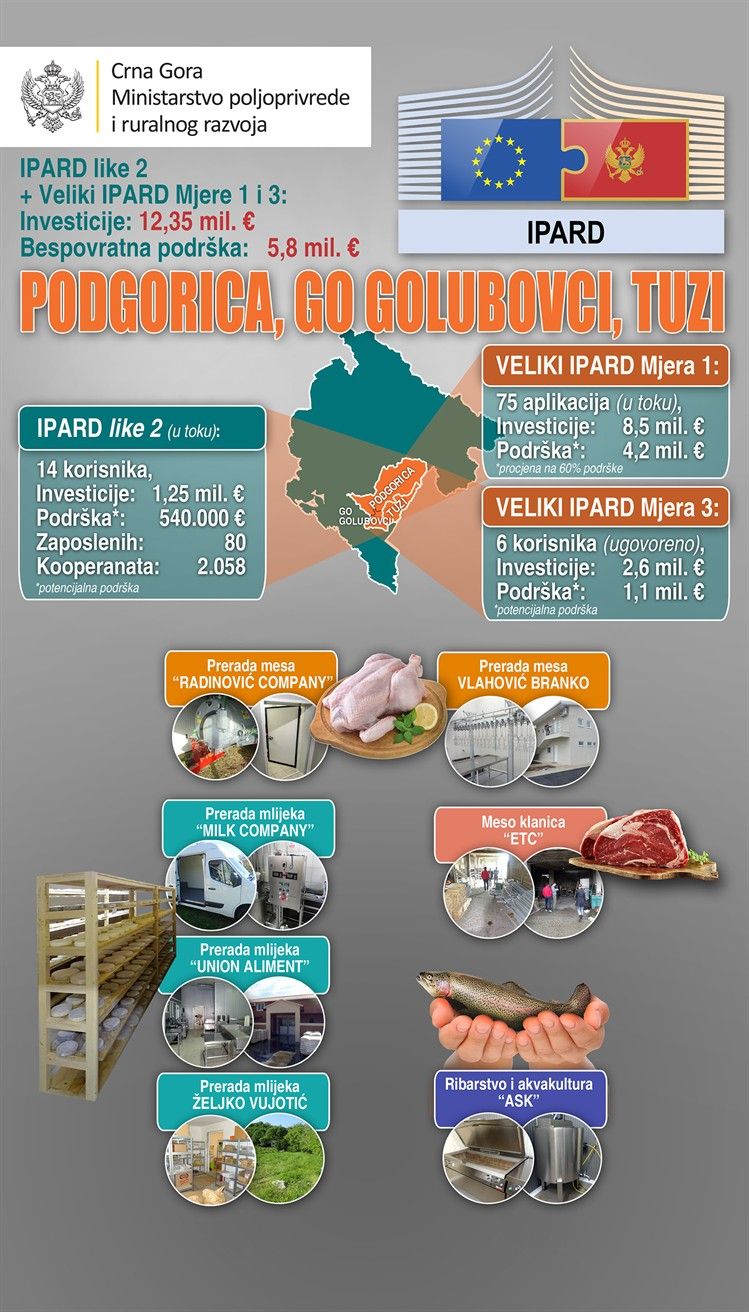
The Government of Montenegro has been making continuous efforts towards systematic provision of fair conditions in the food market since farmers face numerous challenges in an open market game. These are the challenges that European manufacturers face.
"The new Directive on unfair trading practices in the food supply chain, adopted by the European Parliament on 12 March, is a roadmap and framework for the Montenegrin agricultural policy," said Deputy Prime Minister and Minister of Agriculture and Rural Development Milutin Simović
Encouraged by the progress made in the agricultural sector, which significantly contributes to the overall development of the Montenegrin economy, job creation, preservation and improvement of the existing ones, DPM Simović noted that all possibilities should be used to strengthen producers and eliminate the elements of unfair competition.
"I take this opportunity to congratulate the European Parliament, the European Commission and the European Commissioner for Agriculture Phil Hogan on the historical breakthrough - the adoption of the Directive on unfair trading practices in the food supply chain. This directive will be very important for the future of European agriculture, for maintaining the stability of the income of agricultural producers and increasing the living standards of citizens who depend on agricultural and related activities," the Deputy Prime Minister stressed.
This directive, as he pointed out, is a guideline and a framework for the Montenegrin agricultural policy.

